
“Sooner or later, I believe all of us experience times when the very fabric of our world tears at the seams, leaving us feeling alone, frustrated, and adrift. It can happen to anyone. No one is immune. Everyone’s situation is different, and the details of each life are unique. Nevertheless, I have learned that there is something that would take away the bitterness that may have come into our lives. There is one thing we can do to make life sweeter, more joyful, and even glorious. We can be grateful.” – Dieter F Uchtdorf
I think the world will be better when we leave the next generation all the knowledge, skills, and progress we gained during our lifetime. Our knowledge keeps advancing. Our skills keep increasing. We build upon what the previous generation left us. Then add to it, and pass the torch along to those that come after us.
Unfortunately, there are a lot of people who don’t share this same perspective. Some people think the world is worse off than it’s ever been.
And that’s okay.
Our brain does not want to observe all the things in the world going right. Our brain wants to notice the things that should be different. The brain likes to focus on what it believes has gone wrong.
But nothing’s gone wrong. The world and everything living in it are exactly as they should be.
Getting Over Our Brain's Negativity
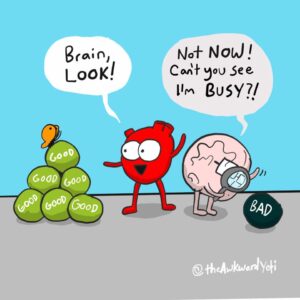
One way that we can combat our brain’s negativity is through the practice of gratitude. Gratitude is the skill of being thankful and showing appreciation.
In today’s modern yoga world, the term gratitude is overused. There are yoga class sequences and meditations focused on the development of gratitude. There are yoga books and apparel that market the idea of gratitude.
A buzzword, like gratitude, can begin to lose its value and meaning when overused. Why should we look past the marketing campaigns and hashtag gratitude picture for the original meaning of the concept?
Here’s why.
As humans, we tend to stack emotions. If I feel bad about something, I am more likely to think more thoughts that generate similar emotions that feel bad. Like when I wake up in the middle of the night to a crying baby my first initial thought may be, “Why is he awake?!” Notice my brain’s negativity bias. It automatically defaults to noticing what it thinks has gone wrong.
This initial thought generates a feeling of annoyance. I am more likely to stack similar thoughts that generate similar feelings. Here’s what that may look like:
“Why is he awake?!”- Annoyed
“I don’t want to leave my warm bed”- Disappointment
“He should be sleeping through the night”- Frustration
“Maybe I am doing something wrong?” – Doubt
“It’s not fair that Joe can fall back asleep so easily”- Anger
The next thing I know, Leo is peacefully asleep, Joe never woke up, and I lie awake angry.
The good news? Just like we layer negative emotions and intensify negativity, we can also layer positive emotions and intensify positive thought.
Gratitude can interrupt our brain’s negativity bias and send us into a positivity spiral. Here’s what that may look like using the same circumstance:
“Why is he awake?!”- Annoyed
“I guess he’s just a little fella”- Patience
“I get to rock Leo back to sleep”- Appreciation
“What a sweet guy”- Love
“I like getting back in my warm bed”- Gratitude
Gratitude Is The Antidote to Worst-Case Scenario Thinking
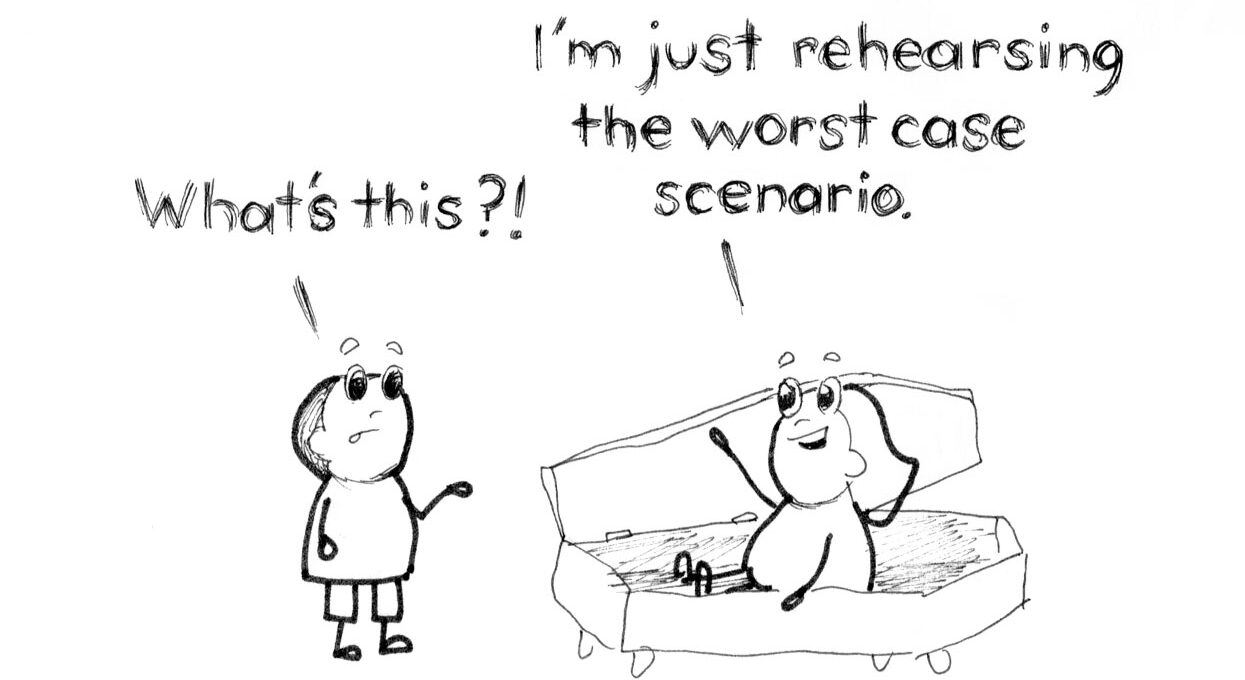
Our minds are really sweet. They try to protect us in all the ways they know how to. The problem with an overprotective mind is that sometimes it does more harm than good. Sometimes the mind discourages us from practicing gratitude in an attempt to hold us back from experiencing joy.
But don’t we all want to experience more joy in life?
According to researcher Brene Brown, joy is the most vulnerable of all human emotions. She says, “It’s almost terrifying to allow ourselves to lean into the feeling of joy, because we’re afraid we’ll be sucker punched by pain or disappointment. So what many of us do is try to outsmart vulnerability so we don’t get sucker punched by pain.”
I too notice that I avoid joy in an attempt to protect myself from experiencing the blows of pain. Instead of being grateful, I look for everything that could go wrong. It happened the other night when Joe lit a fire for my yoga class. It was the first time we had the wood stove going for a class and it worked great! It added a pleasant, soothing, warm, and cozy touch to the room.
But the atmosphere of my mind did not match the ambiance of the room. My brain automatically started stacking worst-case scenario thoughts on top of each other about everything that could go wrong.
What if the room got too hot? What if the smell of the stove irritated people? What if everyone ended up leaving the class because they were too uncomfortable? What if someone passes out and we have to call an ambulance to take them to the hospital? What would the neighbors think? No one would ever come to a class again? This was a TERRIBLE idea!!!
According to Brown, I am not crazy for playing out worst case scenarios in my mind. She said about 90 percent of us experience some degree of “foreboding joy” in an attempt to outsmart vulnerabilities. Vulnerability is real, and we all have a physiological response to it. Vulnerability causes us to shake, shudder or tremble with fear.
Brown advises that if we wish to stop robbing ourselves from experiencing more joy in our lives we must practice gratitude. Rather than use that quivering feeling as a warning sign to start practicing worst-case scenario thinking, we can use it as a reminder to practice gratitude for the things we appreciate about the present moment.
How Yoga Cultivates Gratitude
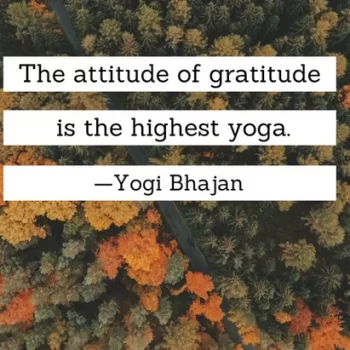
Time on a yoga mat provides us with the opportunity to:
1) Become aware of our thoughts and emotions (without judgment)
2) Notice what is happening rather than what could happen
3) Focus on where we are versus where we think we should be
4) Experience what we are doing versus what we think we should be doing
4) Tune in to how we are feeling rather than try to distract ourselves
5) Practice being present, without judgment, and without attaching a story to our current circumstances
When we shift our focus to these things, we begin to feel grateful for the present moment. When we feel grateful, we are more likely to stack on other emotions that feel good. When we feel better, we are more likely to take positive actions that move us toward living the life we intend to live.
Win. Win. Win.
Bottom Line
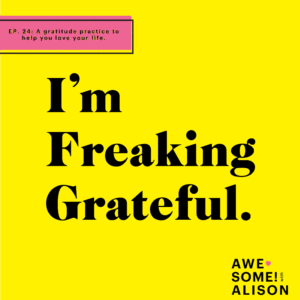
Practice Yoga. Practice Gratitude. You’ll be grateful you did.
Action Points
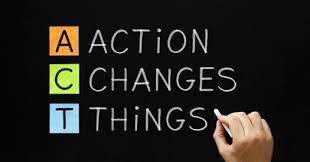
In those deeply joyful moments when you feel that quivering sensation of vulnerability, say, “I’m so grateful for… a fire crackling, or a husband who is nice enough to help me with my class preparations, or having a place to invite others to come and practice yoga in…”
Once you direct your brain to one thing you are grateful for, I guarantee it will begin to search for others. Next thing you know, you’ll be filled with joy and ready to teach an awesome yoga class.







